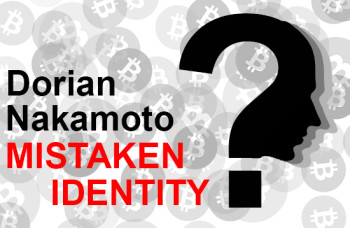
(Illustration by London Shearer Allen)
With the help of his lawyer, Dorian Nakamoto has issued a formal statement denying Newsweek‘s story claiming he is the founder of digital currency Bitcoin.
Nakamoto’s lawyer, Ethan Kirschner, told iMediaEthics by e-mail, “We have no comment beyond confirming that we’ve been retained by Mr. Nakamoto and that it is his statement that was released.”
In case you’ve been living under a rock, Newsweek‘s Leah McGrath Goodman reported in a March 6 cover story that Nakamoto, a 64-year-old Japanese-American man living in California, was the secretive founder of Bitcoin. But, when the story was published, Nakamoto immediately denied the story to the Associated Press, one of the news outlets camped out on his front lawn, and argued that Goodman’s in-the-clutch quote from him only seemed to confirm her conclusion of his ties to Bitcoin and was out-of-context.
The letter, with today’s date March 17, again declares: “I did not create, invent or otherwise work on Bitcoin. I unconditionally deny the Newsweek report.”
Nakamoto claims he didn’t even know the word “bitcoin” until after Newsweek‘s Goodman started contacting him and his family. “I never consented to speak with the reporter,” he wrote, adding that he called the police when she showed up at his house.
(Goodman wrote about this in her article. See our previous report where we called Goodman and Newsweek editors out for going undercover and tricking Nakamoto in the beginning by not properly disclosing who she was and what her story was really about. Nakamoto’s statement seems to further confirm the narrative in her report that indicates she was undercover when first e-mailing him about toy trains, not Bitcoin.)
Nakamoto suggests in his letter that he has possible grounds for damages in a potential invasion of privacy lawsuit. “My prospects for gainful employment has been harmed because of Newsweek‘s article,” he wrote, adding that he would like “privacy.”
Reuters’ Felix Salmon published the letter in full on Twitter today.
Dorian Nakamoto official statement/denial. Very interested to see how @newsweek @truth_eater @jimpoco respond. pic.twitter.com/wfCyK1dQ48
— felix salmon (@felixsalmon) March 17, 2014
Newsweek issued a statement this afternoon on its website that reads “Newsweek has not received any statement or letter from either Mr. Nakamoto or his legal counsel. If and when we do, we will respond as necessary.”
In an e-mail this afternoon to iMediaEthics, Goodman pointed iMediaEthics to that statement. “We have issued a statement today,” she wrote. “See my latest Tweet or the Newsweek site. Thanks.”
iMediaEthics has written to Newsweek for comment on Nakamoto’s statement and asking if they have heard from his lawyer.
Questions Remain about Newsweek story
There have been numerous questions about the Newsweek identification, especially given Nakamoto’s response to the article. Below are some of the outstanding concerns.
- The Los Angeles Times called out Newsweek for not responding to “specific questions raised against the piece” in its March 7 statement defending the article. Newsweek appealed to its own authority in its statement that included comment on the magazine’s history of “high editorial and ethical standards,” but the LA Times pointed out “two problems” with this appeal. “One, the current owners of Newsweek have no connection with the former owners during that 80-year stretch, and two, one of the high points of that tradition of high standards was the old Newsweek‘s publication of the ‘Hitler diaries’ in 1983 — after they were shown to be frauds,” the LA Times reported.
- iMediaEthics is still waiting to find out if Goodman was undercover during her initial contact with Nakamoto. As we wrote March 7, by following Goodman’s narrative closely, it suggests she initially hid her identity from Nakamoto as she got information from him via e-mail. She admits in her article she obtained his e-mail from a toy train company where he shops and their e-mails were first about trains. When she finally told him she was writing about Bitcoin, he shut down their e-mail communication. And, when she showed up at his house to meet and confront him, he called the police.
- Further, the New York Times’ Dealbook tracked down another reason to question the veracity of the Newsweek report: “On Thursday evening, an online Bitcoin forum account long believed to belong to the real Satoshi Nakamoto posted a one-sentence denial that he was the man identified in California. It was the account’s first activity in more than three years.”
- Columbia Journalism Review noted that Goodman herself understands why there are doubts about her article. She told Reuters’ Felix Salmon, who admitted he is “skeptical,” that “If I read my own story, It would not convince me.” CJR argued, “But let’s be very clear: The Newsweek story is an editing problem, not a reporting problem.”
UPDATE: 3/17/2014: 6:50 PM EST Added in comment from Goodman
CORRECTION - March 17, 2014 05:59 PM
No, the five-second rule does not apply here. Due to an editing error, this article incorrectly indicated for a brief time that there was already an invasion of privacy lawsuit in the works.







Comments Terms and Conditions